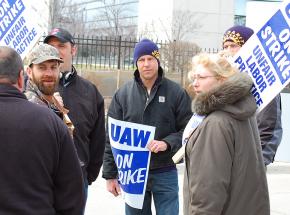Rotten deal at American Axle
reports on a tentative agreement reached by UAW leaders after a three-month strike.
IN A bid to settle a three-month strike at American Axle Manufacturing (AAM), United Auto Workers (UAW) officials have agreed to a familiar litany of concessions that would reduce workers' hourly pay by nearly half, force them to bear a share of health care costs and gut union strength on the shop floor.
The 3,600 workers at five AAM plants in Michigan and New York are expected to complete voting on the proposed four-year contract by May 22. To sweeten the deal, the company will use $200 million from its former owner, GM, to pay for buyout deals for workers who don't want to accept pay cuts.
Workers with 10 or more years of seniority would get a payout of $140,000, while those with fewer years on the job would get $85,000.
If they choose to stay on the job instead, production workers in Detroit would take pay cuts from $28 per hour to just $18.50. Workers classified as "support" workers would be paid $14.35 in Detroit, but just $10 per hour at the plant in the Southwestern Michigan town of Three Rivers. For newly hired production workers, starting pay would be just $11.50, rising to $14.04 over three years. Skilled trades workers would start at $22 per hour, reaching $24.50 over the same period.

The proposed deal would also cut take-home pay through the elimination of daily overtime. Instead of paying time-and-half after eight hours of work, the company would pay workers at straight time until they worked 40 hours in a particular week.
Plus, health care costs would take a big bite out of the smaller paychecks. For the first time, AAM workers would have to pay health care premiums--$10.93 per week for an individual and $27.32 for spouses and children. Payments will rise by 3 percent in 2010, and 3 percent annually thereafter.
Furthermore, the UAW's strength on the shop floor will be diluted. The number of committeepersons--the UAW equivalent of shop stewards--has been reduced. In addition, the union's right to strike over contractual issues would be virtually eliminated.
AAM did promise to invest $200 million in unionized U.S. plants--but it will also close its two forge operations.
UAW President Ron Gettelfinger, speaking at a meeting with AAM workers in Detroit, admitted that the proposed contract was bad. "Nobody (on the bargaining team) is proud of what we have presented to you," he said. He was heckled with shouts of "Vote it down!"
These concessions are completely unnecessary. Unlike the Big Three Detroit automakers, which used big losses to demand givebacks, American Axle last year made $37 million in profits on an income of $3.3 billion.
What's more, the strike showed the UAW's power. The walkout at AAM caused the full or partial shutdown of 30 GM plants. Yet the UAW leadership had already agreed in principle to steep wage cuts, even before the strike began.
Given UAW officials' determination to push through concessions, AAM workers, as at the Big Three and parts maker Delphi, will be tempted to accept the contract and take the buyouts. But after three months on strike, many workers are angry at the concessions and are mobilizing for a "no" vote.


